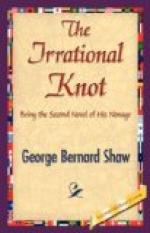P.S.—Since writing the above I have looked through the proof-sheets of this book, and found, with some access of respect for my youth, that it is a fiction of the first order. By this I do not mean that it is a masterpiece in that order, or even a pleasant example of it, but simply that, such as it is, it is one of those fictions in which the morality is original and not readymade. Now this quality is the true diagnostic of the first order in literature, and indeed in all the arts, including the art of life. It is, for example, the distinction that sets Shakespear’s Hamlet above his other plays, and that sets Ibsen’s work as a whole above Shakespear’s work as a whole. Shakespear’s morality is a mere reach-me-down; and because Hamlet does not feel comfortable in it, and struggles against the misfit, he suggests something better, futile as his struggle is, and incompetent as Shakespear shews himself in his effort to think out the revolt of his feeling against readymade morality. Ibsen’s morality is original all through: he knows well that the men in the street have no use for principles, because they can neither understand nor apply them; and that what they can understand and apply are arbitrary rules of conduct, often frightfully destructive and inhuman, but at least definite rules enabling the common stupid man to know where he stands and what he may do and not do without getting into trouble. Now to all writers of the first order, these rules, and the need for them produced by the moral and intellectual incompetence of the ordinary human animal, are no more invariably beneficial and respectable than the sunlight which ripens the wheat in Sussex and leaves the desert deadly in Sahara, making the cheeks of the ploughman’s child rosy in the morning and striking the ploughman brainsick or dead in the afternoon; no more inspired (and no less) than the religion of the Andaman islanders; as much in need of frequent throwing away and replacement as the community’s boots. By writers of the second order the readymade morality is accepted as the basis of all moral judgment and criticism of the characters they portray, even when their genius forces them to represent their most attractive heroes and heroines as violating the readymade code in all directions. Far be it from me to pretend that the first order is more readable than the second! Shakespear, Scott, Dickens, Dumas pere are not, to say the least, less readable than Euripides and Ibsen. Nor is the first order always more constructive; for Byron, Oscar Wilde, and Larochefoucauld did not get further in positive philosophy than Ruskin and Carlyle, though they could snuff Ruskin’s Seven Lamps with their fingers without flinching. Still, the first order remains the first order and the second the second for all that: no man who shuts his eyes and opens his mouth when religion and morality are offered to him on a long spoon can share the same Parnassian bench with those who make an original contribution to religion and morality, were it only a criticism.




